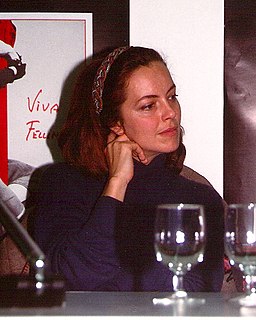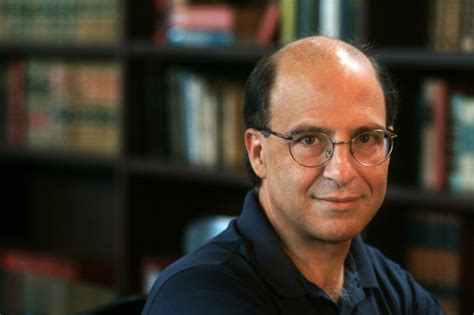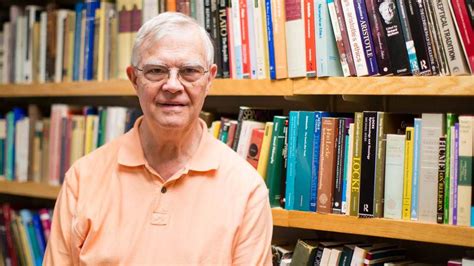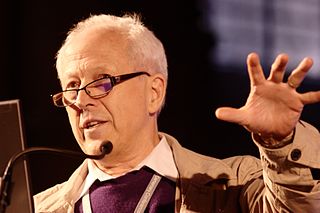Top 914 Philosophical Quotes & Sayings
Explore popular Philosophical quotes.
Last updated on April 21, 2025.
If you read philosophical texts of the tradition, you'll notice they almost never said 'I,' and didn't speak in the first person. From Aristotle to Heidegger, they try to consider their own lives as something marginal or accidental. What was essential was their teaching and their thinking. Biography is something empirical and outside, and is considered an accident that isn't necessarily or essentially linked to the philosophical activity or system.
Philosophy aims at the logical clarification of thoughts. Philosophy is not a body of doctrine but an activity. A philosophical work consists essentially of elucidations. Philosophy does not result in 'philosophical propositions', but rather in the clarification of propositions. Without philosophy thoughts are, as it were, cloudy and indistinct: its task is to make them clear and to give them sharp boundaries.
If there is such a thing as philosophical progress, then why - unlike scientific progress - is it so invisible? Philosophical progress is invisible because it is incorporated into our points of view. What was torturously secured by complex argument comes widely shared intuition, so obvious that we forget its provenance.
I've always been a very rebellious, philosophical person, so my mother set the foundation for my appreciation for nature and my empathy for other people. But then, being a sort of rebellious, philosophical thinker, I'm always looking for new ways to shake things up. So I feel like I'm really lucky to be alive in a time where there's so much opportunity to disrupt and shake it up. It's sort of a combination between that and having the foundation that my mother gave me.
Paul Davies takes us on a logically and rhetorically compelling modern search for human agency. This outstanding analysis, well informed by naturalistic views of our evolved affective nature, is the kind of philosophical work that is essential for a field to move forward when ever-increasing findings from modern science are inconsistent with traditional philosophical arguments. This book is for all who wish to immerse themselves in the modern search for free will. It is steeped in the rich liqueur of current scientific and philosophical perspectives and delusions.
Somebody insults you and you feel anger. Don't miss this opportunity; try to understand why, why this anger. And don't make it a philosophical thing. Don't go to the library to consult about anger. Anger is happening to you -- it is an experience, a live experience. Focus your whole attention on it and try to understand why it is happening to you. It is not a philosophical problem. No Freud is to be consulted about it. There is no need! It is just foolish to consult somebody else while anger is happening to you. You can touch it. You can taste it. You will be burned by it.
Each of the parts of philosophy is a philosophical whole, a circle rounded and complete in itself. In each of these parts, however, the philosophical Idea is found in a particular specificality or medium. The single circle, because it is a real totality, bursts through the limits imposed by its special medium, and gives rise to a wider circle. The whole of philosophy in this way resembles a circle of circles. The Idea appears in each single circle, but, at the same time, the whole Idea is constituted by the system of these peculiar phases, and each is a necessary member of the organisation.
Philosophical argument, trying to get someone to believe something whether he wants to believe it or not, is not, I have held, a nice way to behave towards someone; also it does not fit the original motivation for studying or entering philosophy. That motivation is puzzlement, curiousity, a desire to understand, not a desire to produce uniformity of belief. Most people do not want to become thought-police. The philosophical goal of explanation rather than proof not only is morally better, it is more in accord with one's philosophical motivation.
Philosophy is a necessary activity because we, all of us, take a great number of things for granted, and many of these assumptions are of a philosophical character; we act on them in private life, in politics, in our work, and in every other sphere of our lives -- but while some of these assumptions are no doubt true, it is likely, that more are false and some are harmful. So the critical examination of our presuppositions -- which is a philosophical activity -- is morally as well as intellectually important.
In the first place a philosophical proposition must be general. It must not deal specially with things on the surface of the earth, or within the solar system, or with any other portion of space and time. . . . This brings us to a second characteristic of philosophical propositions, namely that they must be a priori. A philosophical proposition must be such as can neither be proved nor disproved by empirical evidence. . . . Philosophy, if what has been said is correct, becomes indistinguishable from logic as that word has now come to be used.
The terminology of philosophical art is coercive: arguments are powerful and best when they are knockdown, arguments force you to a conclusion, if you believe the premisses you have to or must believe the conclusion, some arguments do not carry much punch, and so forth. A philosophical argument is an attempt to get someone to believe something, whether he wants to beleive it or not. A successful philosophical argument, a strong argument, forces someone to a belief.
My first degree was in mathematics. That was great, but it didn't help with many of the things that puzzled me. I became a philosopher because I wanted to understand everything, especially those things that didn't make sense. And that has continued to be my philosophical motivation. That's one reason I have such a roving philosophical eye - once I have figured out a philosophical topic to my satisfaction, I find myself moving on to new problems.
I use biography, I use literary connections (as with Platen - this seems to me extremely helpful for appreciating the nuances of Mann's and Aschenbach's sexuality), I use philosophical sources (but not in the way many Mann critics do, where the philosophical theses and concepts seem to be counters to be pushed around rather than ideas to be probed), and I use juxtapositions with other literary works (including Mann's other fiction) and with works of music.
Quite early on, and certainly since I started writing, I found that philosophical questions occupied me more than any other kind. I hadn't really thought of them as being philosophical questions, but one rapidly comes to an understanding that philosophy's only really about two questions: 'What is true?' and 'What is good?'
Poetry is a bad medium for philosophy. Everything in the philosophical poem has to satisfy irreconcilable requirements: for instance, the last demand that we should make of philosophy (that it be interesting) is the first we make of a poem; the philosophical poet has an elevated and methodical, but forlorn and absurd air as he works away at his flying tank, his sewing-machine that also plays the piano.
Teaching Plato in Palestine shows how philosophical thinking can illuminate important topics-in particular, the problem of finding ways to engage people with opposed ideologies in fruitful debate. The lively narratives, based on the author's experiences of working with various groups interested in using philosophical tools to clarify their thought and action, will engage a wide range of readers.
On scientific grounds this big bang assumption is much less the palatable of the two. For it is an irrational process that cannot be described in scientific terms. . . . On philosophical grounds too I cannot see any good reason for preferring the big bang idea. Indeed it seems to me in the philosophical sense to be a distinctly unsatisfactory notion, since it puts the basic assumption out of sight where it can never be challenged by a direct appeal to observation.
I fully agree with you about the significance and educational value of as well as history and philosophy of science. So many people today - and even professional - seem to me like someone who has seen thousands of trees but has never seen a forest. A knowledge of the historic and philosophical background gives that kind of independence from prejudices of his generation from which most scientists are suffering. This independence created by philosophical insight is - in my opinion - the mark of distinction between a mere artisan or specialist and a real seeker after truth.
Being a philosophical naturalist does not mean that one thinks that science can provide all of the answers. That is scientism and that is wrong. I don't think a billion buckets of science could speak to the problems raised by the Tea Party. Being a philosophical naturalist does not mean that one thinks that the only truths are those of science. I think the claim just made in the last sentence is true but I don't think it is a claim of science. It means that you use science where you can and you respect and try to emulate its standards.
Logical investigations can obviously be a useful tool for philosophy. They must, however, be informed by a sensitivity to the philosophical significance of the formalism and by a generous admixture of common sense, as well as a thorough understanding both of the basic concepts and of the technical details of the formal material used. It should not be supposed that the formalism can grind out philosophical results in a manner beyond the capacity of ordinary philosophical reasoning. There is no mathematical substitute for philosophy.
Most artists, or at least most of the ones I know, deny having a philosophical outlook that they try to translate into their works. Some had thought of the work of Cezanne and others as being a 'painted epistemology.' But Cezanne himself denied this and Daniel-Henri Kahnwiler, the art critic and art dealer, insisted that none of the many painters he had known had a philosophical culture.
Deng Xiaoping thought of himself as a great revolutionary and a great reformer. He had dismantled the Chinese communist management of the economy. In my next-to-last conversation with him, which was about six months before Tiananmen Square, he said to me that his aim would be the next phase to reduce the Communist Party to philosophical issues. And I said, "What's a philosophical issue?" And he said, "Well, like if we make an alliance with Russia." Given his view of Russia, that was not the likeliest thing that would ever happen.
The conduct of a man, who studies philosophy in this careless manner, is more truly sceptical than that of any one, who feeling inhimself an inclination to it, is yet so over-whelm'd with doubts and scruples, as totally to reject it. A true sceptic will be diffident of his philosophical doubts, as well as of his philosophical conviction; and will never refuse any innocent satisfaction, which offers itself, upon account of either of them.
In elaborating how "philosophy by showing" works, and in defending the idea that literature and music can contribute to philosophical "showing", I am also doing something more standardly philosophical. But I view most of the book as an interweaving of philosophy and literary criticism. If that entails a broadening of a standard idea of philosophy, it's a broadening I'd like to see happen.
I would say I was a philosophical boy. Thoughts about 'identical stones' are the earliest philosophical thoughts I remember. But when I was a teenager I also thought about the more typical philosophical problems teenagers think about: the existence of god, the objectivity of morality, whether one can know that the external world exists.
The concept of intuition is more often used in philosophical theorizing than is the concept of observation in scientific theorizing (proportionately). One reason is that there is (proportionately) more ostensible conflict of philosophical intuitions than there is ostensible conflict of scientific observations. So much for the use of a concept of intuition in philosophical theorizing.

















































